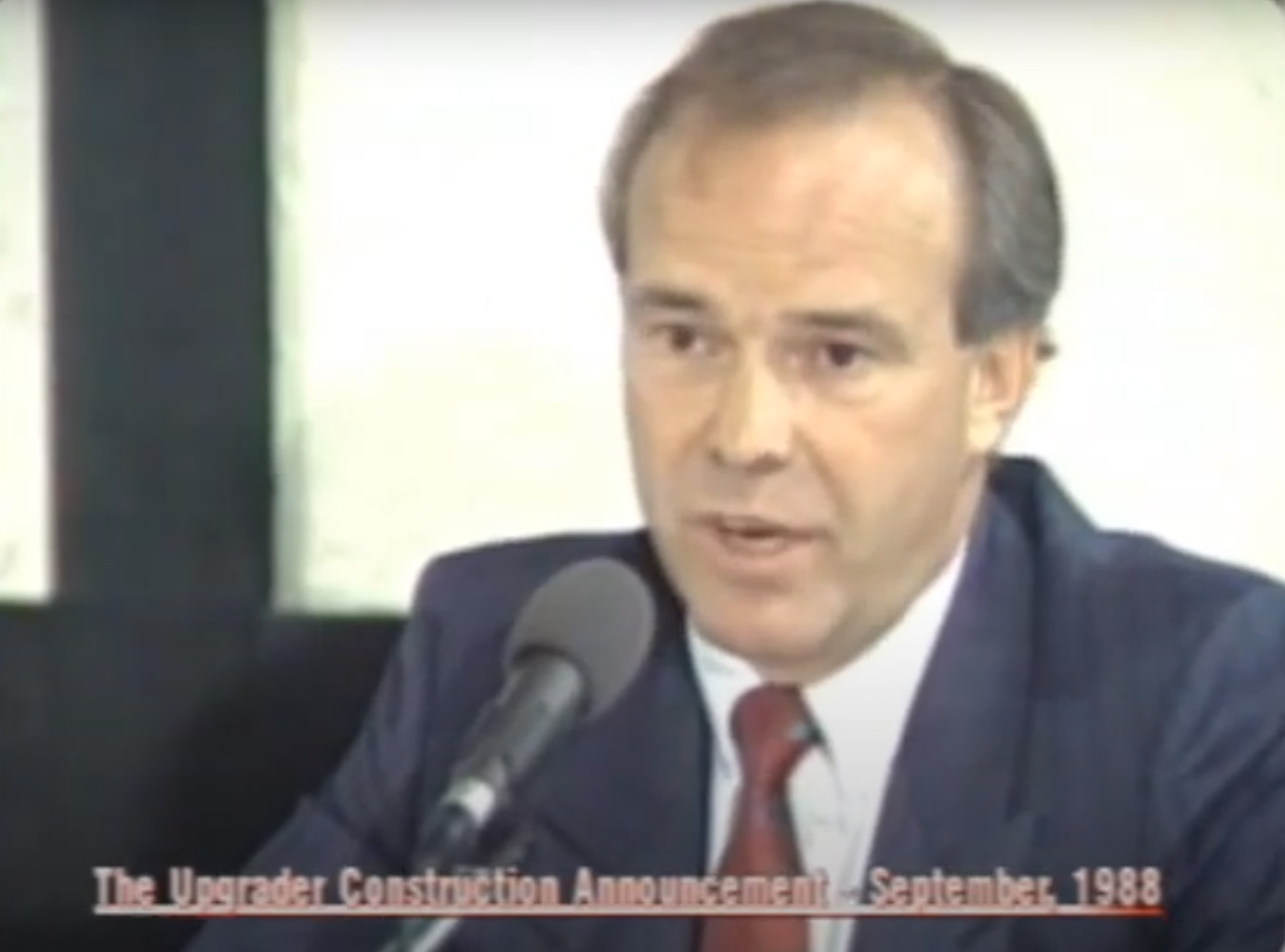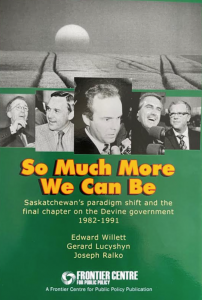This is part 2 of a 6-part series examining the impact the construction of two heavy oil upgraders during Saskatchewan’s Grant Devine Government. The discussion hails from the recently published Frontier Centre book “So Much More We Can Be: Saskatchewan’s Paradigm Shift and the Final Chapter on the Devine Government 1982-1991” by Gerard Lucyshyn, Joe Ralko and Edward Willett. The book makes the case that despite very difficult economic times the Devine Government fundamentally transformed Saskatchewan’s economy into the diversified and prosperous place it is today. Published in 2021 it is now available here at Amazon.ca.
Part 2 of a 6-part series “So Much More We Can Be” – The Grant Devine-era Heavy Oil Upgraders and Their Lasting Impact.
When the Lloydminster Bi-Provincial Upgrader was announced in September 1988, this is what then-Premier Grant Devine said:
“It means diversification. It means the resources. It means community development. It means roads, and it means schools and it means hospitals. It means building. It means homes. It means prosperity!”
And that’s precisely what happened in the 34 years since then.
You can see the announcement on YouTube here.
I spoke to Grant Devine about this article on May 9. Asked how the development of these upgraders came about, he said, “It all started with conversations with the managers of the two refineries, and the general thought in the industry that these refineries needed to be upgraded to take advantage of the amount of oil we had, but the fact was that it needed to be better refined or have something else added to it so that it could be marketed. And so, I was fairly close to the Husky people. I wasn’t that close to our Co-op people.
“In fact, Husky was quite cooperative and wanted help, and obviously got help from the Alberta government and ourselves. And they were more aggressive in dealing with me, I think, in part because of a being a Conservative government. And I said, ‘Well, you know, I agree. I mean, we have these resources.’
“And in my economic training, all the way through to a PhD, all the advantages of value added are certainly there. We had been hewers of wood and haulers of water, as they say, and we needed to add value. So there are many ways that we can do that. Instead of hauling logs, we can haul paper. Instead of drilling and bringing up really, really heavy oil, we could do something to it so we could get it to markets and make it more valuable. So it made sense economically, very much so.”
Devine noted he was MLA for Estevan, but his expertise wasn’t oil, so he relied on the advice of his MLAs, ministers, and people who knew more about oil than he did. Bill Dutton, in particular, was one. Modification of the oil royalty program had proven to be a success, with a three-year royalty holiday. It had a large impact in southeast Saskatchewan, he noted.
Oil people told him, “Clearly, we’ve got the oil, we’ve just got to modify it in a fashion that we can get it to market,” Devine recalled.
Generational impact
An oil price collapse in 1997-98 impacted the development of the projects, especially in their profitability. A previous collapse had occurred in 1986, while he was still in power and when the projects were being developed. Asked if he had thought of pulling the plug at any point, Devine said, “We were elected in really difficult times. Interest rates when I was elected were 22 per cent. And we thought, we got elected we got a big majority. We’re gonna go hard, despite drought and 22 per cent interest rates and all the other things that were hitting people.”
“And so we said, ‘We’ll probably only get four years, so we’re just gonna go to beat the band. And we’re going to build. And my objective, as a PhD economist, was we’ve got to start adding value. And we’ve got to get into these things, regardless of the times.
“We did step up and we help protect people from high interest rates. We took the tax off gasoline, and we’ve provided royalty holidays, and, you know, privatized a bunch of things so that the market could start bringing money in.”
There was some farm wisdom there, too. He said, “Well, I’m a farmer, right? So I’ve seen drought. I’ve seen grasshoppers. I’ve seen the rest of it. People don’t quit. It may not rain in April and May, but you still have got to plant the crops, and you’ve got to have some faith. And we just said, ‘We’re gonna we’re go hard on these.’
“The same attitude prevailed in the upgraders. It made sense. And even though it was difficult, we said, ‘We’re going to we’re going to do this. We’re gonna do it because it makes sense.’ It may take a decade or generation to pay off. And that was the same for the privatization. We privatized potash, oil and uranium. Well, when you first privatized them, they were fine. They look fine, but it took a few years, and some cases more than that, for them to really pay.”
He noted that it took a while for the private sector economy and the general public worldwide to figure out they could invest in potash and uranium, they did. In one year, it resulted in $500 million going to the coffers of the province of Saskatchewan, something that would not have happened if Potash Corporation of Saskatchewan had remained a Crown. And so it was this type of thinking – private investment and transformational investments in upgraders and pulp mills, that would have generational impacts, despite the cyclical nature of these industries.
Devine said, “We can’t just wait for everything to be just right, because it’ll be too late. So we’ve got to build now. And that’s why we built pulp mills, and we built a lot of these other things.”
He and his MLAs thought they their time was limited to move. “We thought, well, probably we’ll only get one term. So we better go hard. So then we got another term. And so we just kept pushing it and pushing it and said, ‘Things will turn around.’ And as you pointed out, frankly, being tenacious enough to stick with it, they all turned around and both of these upgraders spit money out like crazy.”
Between the Lloydminster refinery and upgrader, Regina refinery with its upgrader, and the Moose Jaw refinery, a significant portion of Saskatchewan’s heavy oil is processed in this province. “And it should be,” Devine said. “That’s very good. That’s what we should be doing.”
He would like to see similar value-added processing in agriculture occur in this province, instead of shipping raw goods to China.
Read Part One – Grant Devine’s Two Heavy Oil Upgraders: A Tough Opening Act That Now Anchors Saskatchewan’s Boom Economy
Brian Zinchuk is editor and owner of PipelineOnline.ca and occasional contributor to the Frontier Centre for Public Policy. He can be reached at brian.zinchuk@pipelineonline.ca.




